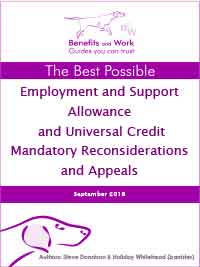How to claim Universal Credit for sickness or disability
Get the right universal credit decision
Are you claiming universal credit because you are unable to work due to sickness or disability?
If so, our universal credit guides will give you the best possible chance of getting the right decision, in spite of a system that is so often bewildering and unfair.
They will help you step-by-step through the claims process and, if necessary, the mandatory reconsideration and appeals procedure.
They will ensure you give information about issues that you won’t be asked about, but which could lead to you being awarded a benefit even if you don’t score any points under the test.
Read on to find out how we can support you through all the stages of your universal credit claim, beginning with the work capability assessment, including completing your UC50 form and attending a face-to-face medical assessment, right through to mandatory reconsideration and appeal.
Or, if you prefer, subscribe right now and download our detailed guides as frequently as you need for a year, instantly.
Should you claim Universal Credit, ESA or both?
Universal credit was supposed to make the claims system simpler by rolling lots of benefits into one.
It hasn’t. It has made it even more complicated, especially if you are sick or disabled.
Because now, instead of just claiming universal credit, you may have to claim employment and support allowance (ESA) as well.
This is due to the fact that universal credit is a means-tested benefit. Your eligibility depends on your household income and savings, but not on your national insurance contributions.
So, if your national insurance record is good enough, you might have to make a claim for new style ESA as well as, or instead of, universal credit.
Fortunately, our combined universal credit and ESA guides will help you with claiming both benefits.
Work capability assessment – be prepared

N.B. In March 2020 the DWP announced that it was suspending face-to-face assessments as a result of the Coronavirus pandemic. Instead, your assessment will be carried out on the papers or over the phone. On July 6th 2020 the DWP announced that there will continue to be no face-to-face assessments.
Although there are many differences between ESA and universal credit, the way they assess how your health conditions or disabilities affect you is the same.
Both use a process, called the work capability assessment (WCA), to decide if you are capable of work.
For universal credit, the WCA divides claimants into three groups:
Capable of work and subject to the full requirements to look for and apply for work, and also subject to the full range of sanctions.
Limited capability for work, meaning that you are expected to be fit to return to work in the future. For the present, you are required to undertake work-related activities that will supposedly help you become work-ready. But you are not required to actually look for work or apply for jobs. You can, however, be sanctioned if you fail to carry out your work-related activities.
Limited capability for work-related activity, meaning that you are not required to carry out any activities at all and you are not subject to sanctions. In addition, you will get an additional amount of money – an element – in your universal credit because you have limited capability for work-related activity. This is the equivalent of the support group in ESA.
The Benefits and Work guides help you through every aspect of the work capability assessment, beginning with the UC50 form.
Completing your UC50 form

Most people who are subject to the work capability assessment will have to fill out a UC50 form.
This form asks you to explain the difficulties you have with physical and mental activities such as:
- Standing and sitting
- Reaching
- Going out
- Coping with social situations
Our guides to universal credit take you box-by-box through the UC50 questionnaire, avoiding the many pitfalls within the form, explaining how to include supporting evidence and how to give information about issues the form fails to ask about, but which could lead to you being found to have limited capability for work-related activity and awarded universal credit with an additional element.
You can find out more about how we can help with the UC50 form here.
Attending your face-to-face assessment
Most face-to-face assessments have currently been suspended due to coronavirus, though they are being reintroduced from May 2021 for some claimants. You are most likely to have a telephone assessment instead, though some assessments will be on paper only and video assessments are being introduced.
Until the beginning of March 2013, the assessments were carried out by a private sector company called Atos.
However, Atos have now been replaced by another private sector company called Maximus, which carries out its work under the name ‘Health Assessment Advisory Service’ (HAAS).
The Maximus health professional is very unlikely to be a doctor. Many are nurses, others are occupational therapists or physiotherapists.
The assessments are seen by many people as a crude and ineffective way of deciding whether you are capable of work. They are often based on assumptions made about you by the health professional but not shared with you.
Our guides can help you prepare and reduce the stress by telling you what will happen, what questions you will be asked and what assumptions may be made about you based on issues such as your appearance and your behaviour.
Learn more about universal credit face-to-face medical assessments and how we can help you prepare.
Requesting mandatory reconsiderations and appeals

If you are unhappy with the decision in your case, we take you step-by-step through the mandatory reconsideration and appeal process.
Mandatory reconsiderations are an additional hurdle created by the DWP to discourage claimants from successfully challenging a decision. The claimant success rate for mandatory reconsiderations is very low and most people do not go on to appeal after being turned down at this stage.
This is just the effect the DWP hoped the mandatory reconsideration system would have.
And it is an enormous shame that it has worked.
Because, the DWP know, and the Tribunal Service statistics prove, that the majority of people who challenge a decision that they are capable of work will win their appeal if they actually go to a tribunal.
The Tribunals Service is an independent body, and claimants get a much fairer hearing than they do when the DWP looks again at its own decisions.
But it is easy to feel utterly overwhelmed by the appeals process, which includes strict time limits, a large bundle of papers and, if you are to have the greatest chance of success, answering questions in front of an appeal panel.
Our guide to universal credit mandatory reconsiderations and appeals will every step of the way through the whole process, helping you to feel in control and giving you the best possible chance of a successful outcome.
Find out more about how our appeals guide can help you, or simply subscribe now and begin preparing to challenge the DWP instantly.


